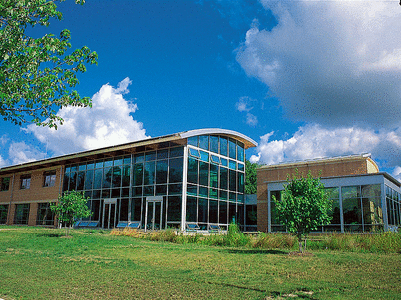
I first met David Orr at a TOOLS conference for environmental groups back in 2009. He gave an inspiring speech which hailed the power of grassroots activists. When I saw that David had also written an essay for the "The New Agrarianism" entitled, The Urban-Agrarian Mind, it confirmed my thoughts to do this first book blog. David is Professor of Environmental Studies at Oberlin College - neighbor to the farm I will be working on next. One of his many accolades is having championed the construction of the Adam Joseph Lewis Center (pictured here) which is a nationally recognized, LEED certified building on Oberlin's campus. His essay tells why he wanted to initiate such a place with an ecologically conscious design.
He opens his essay with an analogy comparing the planet to a train wreck waiting to happen...we are all passengers on a train traveling south headed for environmental and social disaster. A few, we'll call them activists, acknowledge the impending fate and start walking north on the moving train in hopes of reversing this demise. It's not an easy task. There are many obstacles to overcome as they pass through each train car. They slowly make progress and are 25 or more cars back when they realize they are no further north than when they started. But they still keep walking north with conviction. We're still on that train so no happy ending yet. And we still don't know how to reverse the train's direction. But we do know that it will require an upheaval in our industrial paradigm.
For the other passengers on the train, they believe if there really is certain doom, the conductor will stop the train. We, the passengers don't see the signs because many of us have lost a sense of place or as David says, 'knowledge," i.e. agrarian knowledge that helps us relate to the land and our ecosystem. If we had this knowledge, we would observe the crisis and want to address it. As an educator, David wondered how this "loss of knowledge" happened. He looked around his own surroundings at Oberlin College and saw this beautifully manicured, energy intensive campus and realized...No wonder people don't get it. We teach them life skills in a disconnected learning environment where they are asked to think analytically with little applied science to the natural world. That's when David had his ah-ha moment for the Adam Joseph Lewis Center...a place that would restore that connection to our land community (Scott Russell Sanders spoke of the "land community" in the first issue of the book blog). If students were learning in a place that represented what society wanted from its planetary citizens then they would start thinking in centuries not years. By thinking in centuries, we plan for the future with the next seven generations in mind.
In order to transition to a better world, David proposes that we use the dynamics of industry and technology with an agrarian ethic to hold us ecologically accountable.

 RSS Feed
RSS Feed
